人教版八年级上册英语经典讲义
- 格式:doc
- 大小:99.50 KB
- 文档页数:10
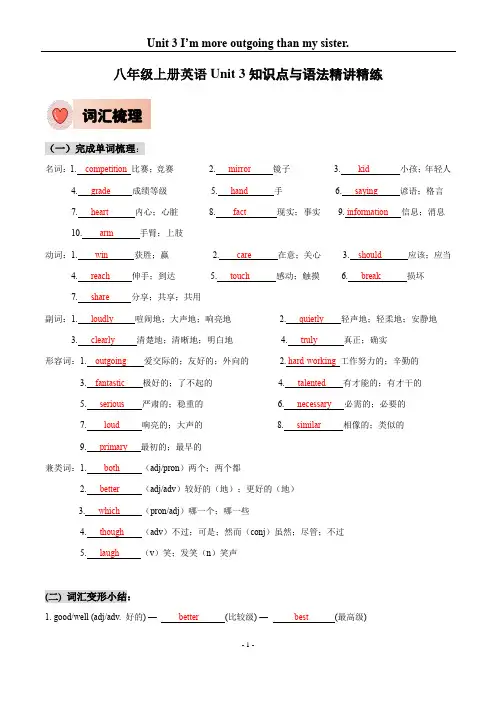
八年级上册英语Unit 3知识点与语法精讲精练词汇梳理(一)完成单词梳理:名词:1. competition比赛;竞赛 2. mirror 镜子 3. kid 小孩;年轻人4. grade 成绩等级5. hand 手6. saying 谚语;格言7. heart 内心;心脏8. fact 现实;事实9. information 信息;消息10. arm 手臂;上肢动词:1. win 获胜;赢 2. care 在意;关心 3. should 应该;应当4. reach 伸手;到达5. touch 感动;触摸6. break 损坏7. share 分享;共享;共用副词:1. loudly 喧闹地;大声地;响亮地 2. quietly 轻声地;轻柔地;安静地3. clearly 清楚地;清晰地;明白地4. truly 真正;确实形容词:1. outgoing 爱交际的;友好的;外向的 2. hard-working工作努力的;辛勤的3. fantastic 极好的;了不起的4. talented 有才能的;有才干的5. serious 严肃的;稳重的6. necessary 必需的;必要的7. loud 响亮的;大声的8. similar 相像的;类似的9. primary 最初的;最早的兼类词:1. both (adj/pron)两个;两个都2. better (adj/adv)较好的(地);更好的(地)3. which (pron/adj)哪一个;哪一些4. though (adv)不过;可是;然而(conj)虽然;尽管;不过5. laugh (v)笑;发笑(n)笑声(二) 词汇变形小结:1. good/well (adj/adv. 好的) — better (比较级) — best (最高级)2. loud (adj. 大声的) — loudly (adv.喧闹地)3. quiet (adj. 安静的) — quietly (adv. 安静地)4. competition (n. 竞争;比赛) — compete (v. 竞争;比赛)5. clearly (adv. 清楚地;清晰地) — clear (adj. 清楚的;清晰的)6. win (v. 赢;获胜) — won (过去式) — winner (n. 获胜者)7. talented (adj. 有才能的) — talent (n. 才能;天赋)8. truly(adv. 真正;确实) — true (adj. 真正的) — truth (n. 真实;真相)9. care(v. 在意;关心) — careful (adj. 认真的;细心的)10. serious(adj. 严肃的;稳重的) — seriously (adv. 严重地;严肃地)11. say(v. 说) — saying (n. 谚语;格言)12. touch(v. 感动;触摸) — touching (adj. 令人感动的) — touched (adj. 感动的)13. break(v. 破坏) — broke (过去式)【练一练】用所给词的适当形式填空1.Class Six won (win) the basketball game but our class lost the game.2.My friend likes telling jokes. He often makes us laugh (laugh)happily.3.Be quiet (quietly)! I have something important to tell you.4.I think Linda dances better (well) than Kate.5.Students can’t speak loudly (loud) in the library.6.Although he is only two years old, he can speak clearly (clear).7.The teacher told us to find out some information (information)about our country and share it next week.8.I’m truly (true) sorry that things had to end like this.st night we saw a movie and it made us touched (touch).10.I don't think differences (different) are important in a friendship.(三) 短语攻关:care about关心;在意be talented in 在……有天赋both...and...……和……都play the drums 敲鼓the singing competition 歌唱比赛be similar to 与……相像的bring out 使显现the same as 和……相同be different from与……不同as long as 只要in fact 事实上primary school 小学get good grades 取得好成绩have fun doing sth 做某事很开心make sb do sth 让某人做某事want to do sth 想要做某事make friends 交朋友be like 像……一样知识点梳理1.Both Sam and Tom can play the drums, but Sam plays them better than Tom. 萨姆和汤姆都会敲鼓,但是萨姆比汤姆敲得好。

八年级上册英语讲义目录Unit 1 Where did you go on vacation?Unit 2 How often do you exercise?Unit 3 I'm more outgoing than my sisterUnit 4 What's the best movie theater?Unit5 Do you want to watch a game show?Unit6 I’m going to study computer science.Unit7 Will people have robots?Unit8 How do you make a banana milk shake?Unit9 Can you come to my party?Unit10 If you go to the party, you’ll have a great time.语法总览Unit 1 复合不定代词,一般过去时的规则动词与不规则动词Unit 2频度副词Unit 3 形容词和副词比较级Unit 4形容词和副词的最高级Unit5动词不定式作宾语Unit6一般将来时:be going to do 的用法Unit7 一般将来时:will do 的用法Unit8可数名词与不可数名词,祈使句Unit9 can表示邀请的用法及其回答Unit10 if引导的条件状语从句;should 的用法Unit1 where did you go on vacation?一、重点词汇anyone ['eniwʌn] pron.任何人wonderful ['wʌndəfl] adj.精彩的;极好的few [fjuː] adj.很少的;n.少量something ['sʌmθɪŋ] pron.某事物;nothing(=not…anything) ['nʌθɪŋ] pron.没有什么n.没有myself [maɪ'self] pron.我自己everyone ['evriwʌn] pron.每人;人人yourself [jɔː'self] pron.你自己;你亲自bored [bɔːd] adj.无聊的;厌烦的;郁闷的seem [siːm] vi.似乎;好像decide [dɪ'saɪd] v.决定;选定try [traɪ] v.尝试;设法;努力wonder ['wʌndə(r)] v.惊奇;想知道;怀疑difference ['dɪfrəns] n.差异;不同wait [weɪt] v.等;等待(wait for)umbrella [ʌm'brelə] n.伞;雨伞wet [wet] adj.湿的;雨天的enough [ɪ'nʌf] adj.足够的adv.足够地;充分地hungry(反full) ['hʌŋɡri] adj.饥饿的;渴望的dislike [dɪs'laɪk] v.不喜欢;厌恶n.不喜爱;厌恶;反感二、短语总汇1、go on vacation去度假,2、stay at home 呆在家,3、go to the mountains 上山/进山,4、go to the beach到海边去,5、visit museums 参观博物馆,6、go to summer camp 去夏令营,7、quite a few 相当多,8、study for为……学习,9、go out 出去,10、most of the time 大部分时间/绝大多数时间,11、taste good 尝起来味道好,12、have a good time玩的开心,13、of course当然可以,14、feel like感觉像……/想要,15、go shopping购物,16、in the past 在过去,17、walk around绕……走,18、too many 太多(可数名词前面),19、because of 因为,20、one bowl of 一碗……,21、find out 查出来/发现,22、go on继续,23、take photos 照相,24、something important重要的事情,25、up and down上上下下,26、come up出来三、语法聚焦A.复合不定代词或副词构成及用法构成:由some, any, no, every分别加上-body, -thing, -one构成的不定代词叫做合成不定代词;加上-where构成副词。

:英语专题:Unit3 I'm more outgoing than my sister重难点精讲题一题面Tina is __________________than Tara.Tina比Tara更外向。
Lisa sang __________________ than Nelly.Lisa唱歌比Nelly更好。
请写出这些词的比较级quicker fatterfiner ugliermore interestingbetter强势比较This painting __________________________.这幅画比那幅要更贵。
He ____________________________.他比我工作更努力。
The air in Beijing is getting much ______ now than a few years ago.A.cleanB.cleanerC.cleanestD.the cleanestWe are glad to see that Shanghai is developing ______ these years than ever before.A.quicklyB.less quicklyC.more quicklyD.the most quicklyJim runs ______ than his brother.A.fastB.fasterC.fastestD.the fastestThe…, the… 结构The older I get, the happier I am.The more exciting it is, the more I like it.题二题面The ____________, the ____________. 越早越好。
比较级+and+比较级The weather is getting colder and colder.She felt herself being more and more nervous.I began to feel ___________________. (越来越健康)程度副词修饰比较级She’s a little more outgoing than me.Is your mother any more relaxed?You’ve got far more (much more) opportun ities than I have.After taking the medicine, he did not get any better.I’m feeling __________________. (好多了)题三题面Tara works as ____________ as Tina. (hard)Are you as ____________ as your sister? (friendly)同级比较This painting is _______________________ that one.这幅画与那幅同样贵。
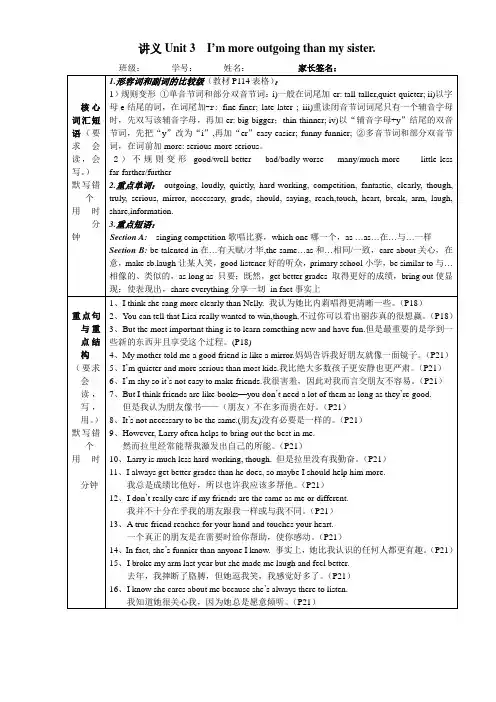
讲义Unit 3 I’m more outgoing than my sister.Exercises:I.用括号内单词的适当形式填空。
1. Tom is _________ ( young ) than Peter, but ___________ (tall) than Peter.2. He comes to school a little____________ (early) than I/me.3. Mary is not as ___________ (serious) as Betty.4.Which is _____________ (heavy), a hen or a chicken?5.-- How _________ (tall) is Sally?-- She' s only 1.40 metres ________ (tall). She is much _________ (short) than Sally. She is also the _________ (short) girl in the class.6. He is _____________(friendly) than the others in the class, I think.7. A dictionary is much _________ ___________(expensive) than a story book.8.-- Annie plays the piano very ___________ (good).-- Sue plays it _____ (well) than Annie. And Sally plays it the __________ (well).9. Practise as __________ (much) as you can.10. Her mother is getting ____________(fat) and ________ (fat).II.根据汉语和所给提示翻译句子(每空不限词数)1.那个男孩比班上任何一个学生都高。
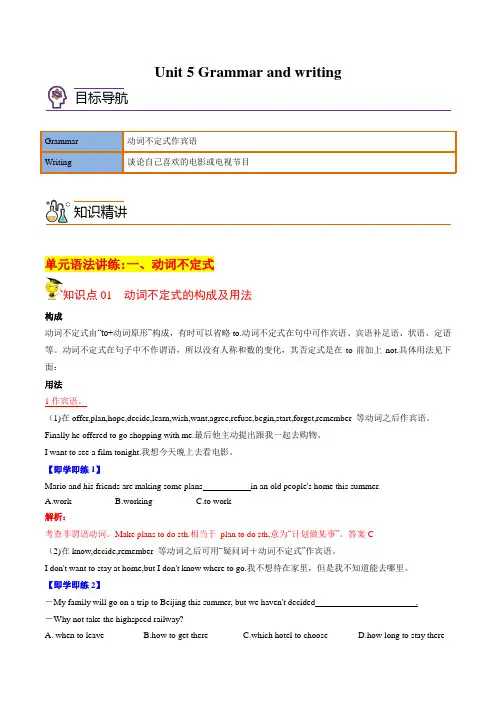
Unit 5 Grammar and writing目标导航Grammar 动词不定式作宾语Writing 谈论自己喜欢的电影或电视节目知识精讲单元语法讲练:一、动词不定式知识点01 动词不定式的构成及用法构成动词不定式由“to+动词原形”构成,有时可以省略to.动词不定式在句中可作宾语、宾语补足语、状语、定语等。
动词不定式在句子中不作谓语,所以没有人称和数的变化,其否定式是在to前加上not.具体用法见下面:用法1作宾语。
(1)在offer,plan,hope,decide,learn,wish,want,agree,refuse,begin,start,forget,remember 等动词之后作宾语。
Finally he offered to go shopping with me.最后他主动提出跟我一起去购物。
I want to see a film tonight.我想今天晚上去看电影。
【即学即练1】Mario and his friends are making some plans in an old people's home this summer.A.workB.workingC.to work解析:考查非谓语动词。
Make plans to do sth.相当于plan to do sth,意为“计划做某事”。
答案C(2)在know,decide,remember 等动词之后可用“疑问词+动词不定式”作宾语。
I don't want to stay at home,but I don't know where to go.我不想待在家里,但是我不知道能去哪里。
【即学即练2】-My family will go on a trip to Beijing this summer, but we haven't decided .-Why not take the highspeed railway?A. when to leaveB.how to get thereC.which hotel to chooseD.how long to stay there解析:考查“疑问词+不定式”的用法。
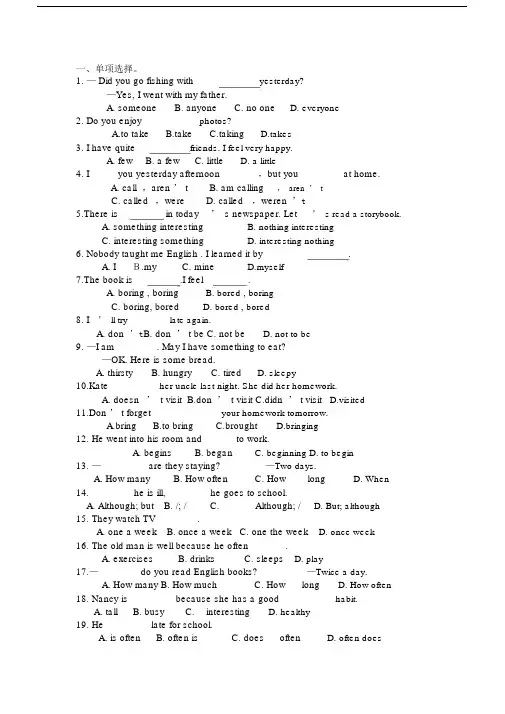
一、单项选择。
1. — Did you go fishing with yesterday?—Yes, I went with my father.A. someoneB. anyoneC. no oneD. everyone2. Do you enjoy ________photos?A.to takeB.takeC.takingD.takes3. I have quite friends. I feel very happy.A. fewB. a fewC. littleD. a little4. I _____you yesterday afternoon,but you ________at home.A. call ,aren ’ tB. am calling,aren’tC. called,wereD. called,weren’t5.There is in today’ s newspaper. Let’ s read a storybook.A. something interestingB. nothing interestingC. interesting somethingD. interesting nothing6. Nobody taught me English . I learned it by.A. IB.my C. mine D.myself7.The book is.I feel.A. boring , boringB. bored , boringC. boring, boredD. bored , bored8. I’ ll try________ late again.A. don ’tB. don ’ t beC. not beD. not to be9. —I am________. May I have something to eat?—OK. Here is some bread.A. thirstyB. hungryC. tiredD. sleepy10.Kate________ her uncle last night. She did her homework.A. doesn’ t visitB.don’ t visitC.didn ’ t visitD.visited11.Don ’ t forget ________your homework tomorrow.A.bringB.to bringC.broughtD.bringing12. He went into his room and ______to work.A. beginsB. beganC. beginningD. to begin13. — ________ are they staying?—Two days.A. How manyB. How oftenC. How longD. When14.________ he is ill, ________he goes to school.A. Although; butB. /; /C.Although; /D. But; although15. They watch TV________.A. one a weekB. once a weekC. one the weekD. once week16. The old man is well because he often_______.A. exercisesB. drinksC. sleepsD. play17.—________do you read English books?—Twice a day.A. How manyB. How muchC. How longD. How often18. Nancy is ________ because she has a good habit.A. tallB. busyC. interestingD. healthy19. He ________ late for school.A. is oftenB. often isC. does oftenD. often does20.Tom, your father is waiting ________ you at the school gate.A.forB.atC.withD.as21. —Where ____ you ____ lunch?—At home. There was no school lunch.A. did, haveB. are, havingC. will, haveD. do , have22. —How was your vacation? — ______ . I liked it very much.A. Very badB. WonderfulC. I ’ m fineD. Have a good time23. —Steven, can you help me buy some meat? — __ ,I like shopping.A. That ’ s rightB. SorryC. Of courseD. You ’ re welcome24.— What are you going to give your mother for her birthday?— I ’m not sure. But I ’ llbuy her ______ . A.something special B. anything special C. specialsomething D. special anything25.---Do you have ____to say for yourself?---No, I have ______to say.A. something; everythingB. nothing; somethingC. everything; anythingD. anything; nothing26. There is _____ wrong with his eyes. He can ’ t see things clearly.A. somethingB. anythingC. nothingD. everything27. ---______ was your vacation? --- It _____ exciting.A. How; wereB.What; wereC. How; wasD. What; was28 . I don ’ t want to go to the museum, it ’ s too .A. relaxingB. boringC. boredD. beautiful29 . I didn ’ t go to the mountains ______the bad weather.A. soB. because ofC. becauseD. but30. Do you enjoy ______ photos?A. to takeB. takeC. takingD. takes31. Yesterday afternoon, we ______to the park.A. wentB. goC. goesD. goed32 . It ’ s cold, so we decided ______at home.A. stayB. to stayC. stayingD. stayed33 . She didn ’ t ______ me about it.A. toldB. tellC. tellingD. tells34. Although he is very old, ______ he works very hard.A. soB. butC. andD. /35. Xiao Zhang ________ watches TV. He likes going online.A. hard everB. hardly everC. does n’ t hard everD. doesn ’ t hardly ever36.Here ____ the results _____ the students activity survey.A. is; withB. are; ofC. is; ofD. are; with 37. My parents are ingood _______. They are pretty _______.A. health; healthB. healthy; healthyC. health; healthyD. healthy; health38 . It’ s good _______ your health ________.A. for; to drink milkB. for; drink milkC. of; drink milkD. of; to drink milk39. I usually go to the movies ________ a month.A. twiceB. twice timeC. two timesD. twice times40. _____do they play football? —Sometimes.A. How soonB. How muchC. How manyD. How often41. His mother wants him _____ at home today.A. stays C. stayed C. to stay D. staying42. My grandfather _______ ten years ago.A. deadB. dieC. deathD. died43. Eighty percent of the teachers _ women teachers in our school. A. is B. are C. be D. was二、完形填空。

新目标八年级上册Unit 10(一)单词meeting n. 会议;集会;会面video n. 录像带;录像organize v.(=organ ise) 组织;筹备potato chips 炸土豆片;炸薯条chocolate n. 巧克力upset adj. 难过;失望;沮丧taxi n. 出租汽车;的士advice n. 劝告;建议travel v.& n. 旅行;游历agent n. 代理人;经纪人expert n. 专家keep…to someone 保守秘密teenager n. (13~19岁的)青少年normal adj. 正常的;一般的unless conj. 除非;如果不certainly adv. 无疑;肯定;当然;行wallet n. 钱包mile n. 英里angry adj. 发怒的;生气的understanding adj. 善解人意的;体谅人的careless adj. 粗心的;不小心的mistake n. 错误;失误himself pron. 他自己careful adj.小心的;细致的;精心的;慎重的advise v. 劝告;建议solve v. 解决;解答step n. 步;步骤trust v. 相信;信任experience n. 经验;经历in half 分成两半halfway adj.&adv. 在中途;部分地做(或达到)else adv.别的;其他的Karen 卡伦(女名)Ben 本(男名)Michael 迈克尔(男名)Laura 劳拉(女名)Millis米尔斯(姓)Robert 罗伯特(男名)Hunt 亨特(姓)(二)课文翻译1b Listen and plete the responses in 1a.Conversation 1Peter: Hi, John. What will you wear to the party?John: I think I’ll wear jeans to the party.Peter: That’s not a good idea. If you do, the teachers won’t let you in. John: Really?Peter: Yes.John: Then I’ll wear my smart trousers.Peter: Good idea.Conversation 2Mary: Hi, Sam. Will you go to the party?Sam: No, I think I’ll stay at home.Mary: Oh, why? If you do, you’ll be sorry.Sam: Yes, I know. But my friends won’t go.Mary: Well, I’ll go. You can e with me.Sam: OK.Conversation 3Mark: Hey, Alice. Will you take a taxi to the party?Alice: Hi, Mark. No, I think I’ll take the bus to the party.Mark: The bus? If you do, you’ll be late.Alice: Yes, I know. But a taxi is expensive.Mark: Well. We can take a taxi together. That’ll be cheaper.Alice: OK. That’s a great idea.Conversation 4Brenda: Hi, Alison. How are you?Alison: Good, thanks, Brenda. Will you go to the party?Brenda: Yes. What about you?Alison: Me, too. And I think I’ll go to the party with Karen and Anna. Brenda: That’s good. If you do, you’ll have a great time.Alison: Who will you go with?Brenda: I don’t know.Alison: You can e with us if you want.Brenda: OK, thanks.1b 听录音,完成1a中的回答。
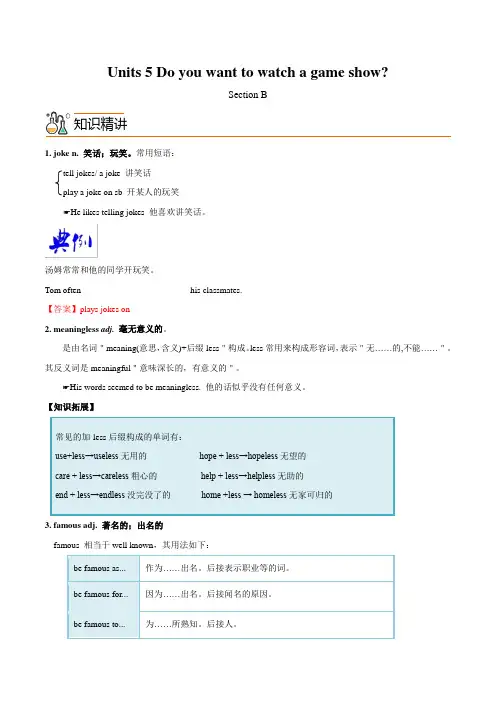
Units 5 Do you want to watch a game show?Section B知识精讲1. joke n. 笑话;玩笑。
常用短语:tell jokes/ a joke 讲笑话play a joke on sb 开某人的玩笑☛He likes telling jokes 他喜欢讲笑话。
汤姆常常和他的同学开玩笑。
Tom often________ ________ ________his classmates.【答案】plays jokes on2. meaningless adj.毫无意义的。
是由名词"meaning(意思,含义)+后缀less"构成。
less常用来构成形容词,表示"无……的,不能……"。
其反义词是meaningful"意味深长的,有意义的"。
☛His words seemed to be meaningless. 他的话似乎没有任何意义。
【知识拓展】常见的加-less后缀构成的单词有:use+less→useless无用的hope + less→hopeless无望的care + less→careless粗心的help + less→helpless无助的end + less→endless没完没了的home +less → homeless无家可归的3.famous adj. 著名的;出名的famous 相当于well known,其用法如下:be famous as... 作为……出名。
后接表示职业等的词。
be famous for... 因为……出名。
后接闻名的原因。
be famous to... 为……所熟知。
后接人。
☛Bruce Lee is famous as an actor. 李小龙作为演员出名。
☛Lang Lang is famous for playing the piano. 郎朗因为弹钢琴出名。
Mo Yan is famous his novels.A.asB.forC.inD.to【答案】B【解析】本题用固定短语法。
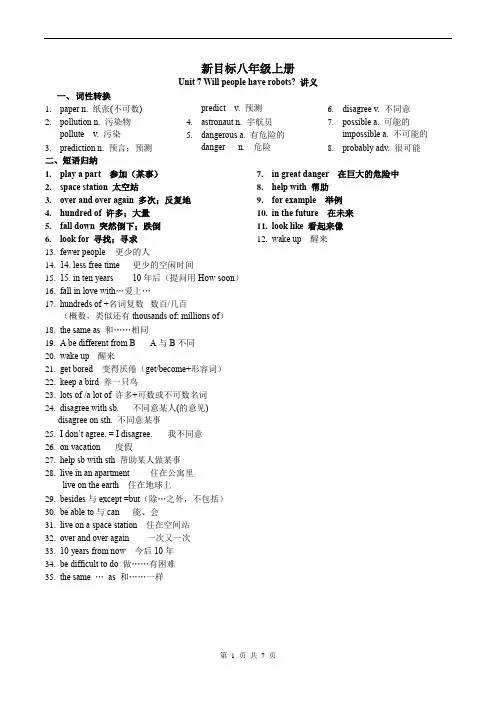
新目标八年级上册Unit 7 Will people have robots? 讲义一、词性转换1.paper n. 纸张(不可数)2.pollution n. 污染物pollute v. 污染3.prediction n. 预言;预测predict v. 预测4.astronaut n. 宇航员5.dangerous a. 有危险的danger n. 危险6.disagree v. 不同意7.possible a. 可能的impossible a. 不可能的8.probably adv. 很可能二、短语归纳1.play a part 参加(某事)2.space station 太空站3.over and over again 多次;反复地4.hundred of 许多;大量5.fall down 突然倒下;跌倒6.look for 寻找;寻求7.in great danger 在巨大的危险中8.help with 帮助9.for example 举例10.in the future 在未来11.look like 看起来像12.wake up 醒来13.fewer people更少的人14.14. less free time更少的空闲时间15.15. in ten years 10年后(提问用How soon)16.fall in love with…爱上…17.hundreds of +名词复数数百/几百(概数,类似还有thousands of; millions of)18.the same as 和……相同19.A be different from B A与B不同20.wake up醒来21.get bored变得厌倦(get/become+形容词)22.keep a bird 养一只鸟23.lots of /a lot of许多+可数或不可数名词24.disagree with sb.不同意某人(的意见)disagree on sth. 不同意某事25.I don’t agree. = I disagree.我不同意26.on vacation度假27.help sb with sth 帮助某人做某事28.live in an apartment住在公寓里live on the earth 住在地球上29.besides与except =but(除…之外,不包括)30.be able to与can 能、会31.live on a space station 住在空间站32.over and over again 一次又一次33.10 years from now 今后10年34.be difficult to do 做……有困难35.the same …as 和……一样三、重难点深度解析1. Do you think there will be robots in people's homes? 你认为将来人们的家里会有机器人吗?Do you think...? 结构通常用来征求对方的意见或看法,后面接宾语从句,从句用陈述语序。

Unit1 Where did you go on vacation?一、重点短语go on vacation去度假stay at home待在家里go to the mountains去爬山go to the beach去海滩visit museums 参观博物馆go to summer camp去参观夏令营quite a few相当多study for为……而学习go out出去most of the time大部分时间taste good尝起来很好吃have a good time玩得高兴of course当然feel like给……的感觉;感受到go shopping去购物in the past在过去walk around四处走走because of因为one bowl of… 一碗…… the next day第二天drink tea喝茶find out找出;查明go on 继续something important重要的事up and down上上下下come up出来take photos照相二、句型集萃buy sth、for sb、/ buy sb、sth、为某人买某物taste + adj、尝起来……seem+(to be)+ adj、瞧起来……keep doing sth、继续做某事arrive in+大地点/ arrive at+小地点到达某地tell sb、(not) to do sth、告诉某人(不要)做某事try doing sth、尝试做某事/ try to do sth、尽力去做某事decide to do sth、决定去做某事forget doing sth、忘记做过某事/ forget to do sth、忘记做某事enjoy doing sth、喜欢做某事want to do sth、想去做某事stop doing sth、停止做某事dislike doing sth、不喜欢做某事Why not do、sth、?为什么不做……呢?so+adj、+that 如此……以至于……look+adj、瞧起来……start doing sth、开始做某事三、单元重点、难点、考点精讲(一)Section A1、Where did you go on vacation? 您去哪里度假了?(P1)1)这就是有疑问副词where引导的特殊疑问句,where用来询问地点与场所,放在句首。
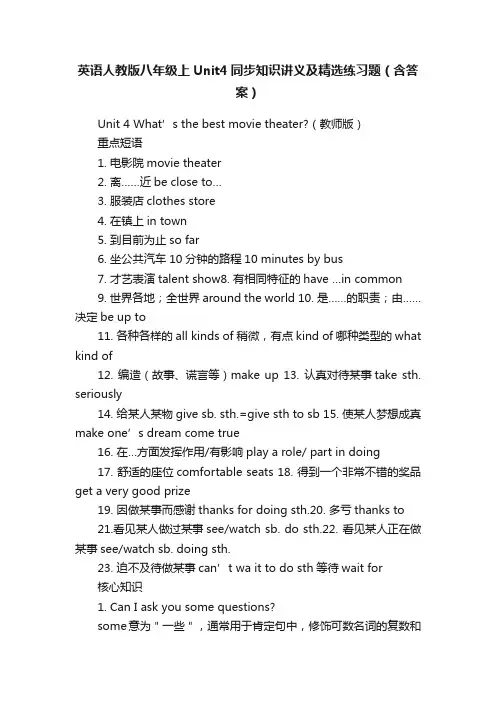
英语人教版八年级上Unit4同步知识讲义及精选练习题(含答案)Unit 4 What’s the best movie theater?(教师版)重点短语1. 电影院movie theater2. 离……近be close to…3. 服装店clothes store4. 在镇上in town5. 到目前为止so far6. 坐公共汽车10分钟的路程10 minutes by bus7. 才艺表演talent show8. 有相同特征的have …in common9. 世界各地;全世界around the world 10. 是……的职责;由……决定be up to11. 各种各样的all kinds of 稍微,有点kind of哪种类型的what kind of12. 编造(故事、谎言等)make up 13. 认真对待某事take sth. seriously14. 给某人某物give sb. sth.=give sth to sb 15. 使某人梦想成真make one’s dream come true16. 在…方面发挥作用/有影响play a role/ part in doing17. 舒适的座位comfortable seats 18. 得到一个非常不错的奖品get a very good prize19. 因做某事而感谢thanks for doing sth.20. 多亏thanks to21.看见某人做过某事see/watch sb. do sth.22. 看见某人正在做某事see/watch sb. doing sth.23. 迫不及待做某事can’t wa it to do sth等待wait for核心知识1. Can I ask you some questions?some意为"一些",通常用于肯定句中,修饰可数名词的复数和不可数名词,但在提出建议、请求或期望对方作出肯定回答的疑问句中,也用some,不用any。
初中英语八年级上册复习要点Unit 1 Where did you go on vacation? 重点短语:(1)go on vacation 去度假(2)stay at home 呆在家(3)go to the mountains 去爬山(4)go to the beach去沙滩(5)visit museums 参观博物馆(6)go to summer camp 夏令营(7)quite a few 相当多,不少(8)study for……为…而学习(9)go out 出去(10)most of the time大多数时间(11)taste good 尝起来不错(12)have a good time过得愉快(13)feel like 感受到(14)go shopping 去买东西(15)in the past 在过去(16)walk around…..四处走走(17)too many 太多(18)because of+短语因为(19)one bowl of 一碗。
(20)find out 查明,弄清(21)take photos 照相(22)something important 重要的事情(23)up and down 上上下下(24)come up 上来,出现(25)of course 当然(26)come down 下来重点语法:(1)Where did you go on vacation I went to New York City.(2)Did you go out with anyone No, No one was here. Everyone was on vacation. (3)Did you buy anything special Yes, I bought something for my father.(4)How was the food Everything tasted really good.(5)Did everyone have a good time Oh,yes. Everything was excellent.习惯用法:(1)buy sth for sb./ buy sb. sth 为某人买某物(2)taste + adj. 尝起来……(3)nothing ….but + V.(原形) 除了…之外什么都没有(4)seem + (to be) + adj 看起来(5). arrive in + 大地方arrive at + 小地方到达某地(6)decide to do sth. 决定做某事(7). try doing sth. 尝试做某事(8)try to do sth. 尽力做某事(9)try one`s best to do sth尽力做某事(10)enjoy doing sth. 喜欢做某事(11)want to do sth.想去做某事(12)start doing sth. 开始做某事(13)stop doing sth. 停止做某事stop to do sth 停下来做某事(14)look + adj 看起来(15)dislike doing sth. 不喜欢做某事(16)Why not do sth. 为什么不做…….呢?(17)so + adj + that + 从句如此…以至于(18)tell sb. (not) to do sth. 告诉某人(不要)做某事(19)keep doing sth. 继续做某事(20).forget to do sth. 忘记去做某事(未做)forget doing sth忘记做过某事(已做)词语辨析:○1anywhere 与somewhere 两者都是不定副词。
新目标八年级上册Unit 9 Can you come to my party? 讲义一、短语归纳1.on Saturday afternoon在周六下午2.prepare for为……做准备3.go to the doctor去看医生4.have the flu患感冒5.help my parents帮助我的父母e to the party来参加聚会7.another time其他时间st fall去年秋天9.go to the party去聚会10.hang out常去某处;泡在某处11.the day after tomorrow后天12.the day before yesterday前天13.have a piano lesson上钢琴课14.look after照看;照顾15.accept an invitation接受邀请16.turn down an invitation拒绝邀请17.take a trip去旅行18.at the end of this month这个月末19.look forward to盼望;期待20.the opening of………的开幕式/落成典礼21.reply in writing书面回复22.go to the concert去听音乐会23.not…until直到……才24.meet my friend会见我的朋友25.visit grandparents拜访祖父母26.study for a test为考试学习27.have to不得不28.too much homework太多作业29.do homework做家庭作业30.go to the movies去看电影31.after school放学后32.on the weekend在周末二、句型荟萃1. invite sb. to do sth. 邀请某人做某事2. what引导的感叹句结构:What+a/an+adj.+可数名词单数(+主语+谓语)!3. What+adj.+名词复数/不可数名词(+主语+谓语)!4. help sb.(to)do sth.帮助某人做某事5. be sad to do sth.做某事很悲伤6. see sb. do sth. see sb.doing sth.7. the best way to do sth.做某事最好的方式8. have a surprise party for sb.为某人举办一个惊喜派对9. look forward to doing sth.期盼做某事10. reply to sth./sb.答复某事/某人11. What’s today?今天是什么日子?What’s the date today? What day is it today?三、重难点知识讲解1. Can you come to my party on Saturday afternoon?in:用在上午下午晚上,在月份、季节和年之前;on用在星期、日期、节日和特定的某一天前。
短语背诵大全Unit1 Where did you go on vacation?go on vacation去度假stay at home待在家里go to the mountains去爬山go to the beach去海滩visit museums 参观博物馆go to summer camp去参观夏令营quite a few相当多study for为……而学习go out出去most of the time大部分时间taste good尝起来很好吃have a good time玩得高兴of course当然feel like给……的感觉;感受到go shopping去购物in the past在过去walk around四处走走because of因为go on继续one bowl of… 一碗…… the next day第二天drink tea喝茶find out找出;查明take photos照相something important重要的事up and down上上下下come up出来Why not do. sth.?为什么不做……呢?buy sth. for sb. / buy sb. sth.为某人买某物seem+(to be)+ adj. 看起来……taste + adj. 尝起来…… look+adj. 看起来……decide to do sth.决定去做某事nothing…but+动词原形除了……之外什么都没有want to do sth.想去做某事arrive in+大地点/ arrive at+小地点到达某地try doing sth.尝试做某事/ try to do sth.尽力去做某事forget doing sth.忘记做过某事/ forget to do sth.忘记做某事enjoy doing sth.喜欢做某事start doing sth.开始做某事stop doing sth.停止做某事dislike doing sth. 不喜欢做某事keep doing sth.继续做某事s o….that…如此……以至于……tell sb. (not) to do sth. 告诉某人(不要)做某事help with housework帮助做家务on weekends在周末how often多久一次hardly ever几乎从不once a week每周一次twice a month每月两次every day每天be free有空go to the movies去看电影use the Internet用互联网swing dance摇摆舞play tennis打网球stay up late熬夜;睡得很晚at least至少have dance and piano lessons上舞蹈课和钢琴课go to bed early早点睡觉play sports进行体育活动be good for对……有好处go camping去野营not…at all一点儿也不…… in one’s free time在某人的业余时间the most popular最受欢迎的such as比如;诸如old habits die hard积习难改go to the dentist去看牙医morn than多于;超过less than少于help sb. with sth.帮助某人做某事How about…? ......怎么样?/ ……好不好?want sb. to do sth.想让某人做某事How many+可数名词复数?……有多少……? spend time with sb.和某人一起度过时光the best way to do sth.做某事的最好方式It’s+ adj.+ to do sth. 做某事的……的。
学科:英语专Unit 1 Where did you go on vacati on题:题一题面---Did you go to Guizhou with ______ ?---Yes, I went there with my family.A. some oneB. anyoneC. every oneD. no one复合不定代词指代人:some one, anyone, no one, every one,somebody, an ybody, n obody, everybody指代事物:someth ing, anything, nothing, everyth ing用something, anything, nothing, everything 填空。
---Is there ___________ on my no se?---Yes, there is ____________on your no se. Its a fly! anything何时用于肯定句?You can ask me anything you want to know.当形容词修饰不定代词时……---Come here, I ' II tell you something interesting.---Did you buy anything special?---Yes, I bought a pet spider.---Did you see _____ in your class?---No, I know all of them.A. some one newB. new some one题二题面I _________________ my uncle on vacation.我在假期去看望了叔叔。
I visit my grandparents once a week. 我每周都去爷爷奶奶一次。
Unit 9如何写以“邀请”为话题的文章【例文1】假如你是Tom, 你准备举办一个14岁的生日派对, 想要邀请Jack 去你家里(Green street), 请根据下面的提示给Jack 写一封邀请函。
1.生日在2019年12月14号周六晚上7点2.派对上可以欣赏优美的音乐, 吃各种美味的食物3.可以携带朋友, 在派对上跳舞4.希望你12月10号前回复我。
Dear Jack,I would like to invite you to my 14th birthday party________________________________________________.一.审题二.文章布局开头:发出邀请 以“I would like to invite you to...”发出邀请正文:具体内容 time/where/activities......结尾:表达期望 I will be happy if you come.三.遣词造句①词汇库准备prepare/preparation; 考试exam; 有空的free/available; 赶上catch; 邀请invite/invitation; 接受accept; 拒绝refuse; 回复reply; 高兴glad; 惊奇的surprised; 乔迁聚会housewarming; 开幕式opening; 音乐会concert; 事件event; 客人guest②短语箱为...做准备prepare...for; 看医生go to a doctor; 为考试学习study for a test; 其他时间another time; 闲逛hang out; 照顾look after; 期待look forward to; 去旅行take a trip; 解决难题help out; 接到...来信hear from; 拒绝turn down; 玩得开心enjoy oneself; 听音乐listen to music③链接句型1.Can you come to my party? Sure, I’d love to. / Sorry, I must study for a math test.2.I’m sorry. I’m not available. I have too much homework this weekend.3.We’re planning a house warming party at a new house this Saturday.4.Please let us know by Wednesday if you can come to the party.5.I would like to invite you to the opening of our new library at No. 9 high school.6.The opening will be on the morning of Wednesday, January 8th at nine o’clock.7.I would also like to invite each parent to bring one book as a gift for the new library.8.Please reply in writing to this invitation by Friday, December 20th.9.I will be glad If you can come. Look forward to your coming.四.作文模板Dear Jack,I would like to invite you to ____事件_________ at/in____地点______. It will be on the_早上/下午/晚上___ of___星期_____,____具体日期______at____时刻点_______.During it, you can _____________________. I also would like to invite you to bring__________. You will enjoy yourself. Please reply inwriting to this invitation by___星期_______,____具体日期________.I will be happy if you can come. Looking forward to your coming.五.参考范文Dear Jack,I would like to invite you to my 14th birthday party at my home on Green Street. The party will be on the evening of Saturday, December 14th at 7:00.During it, you can listen to some beautiful music and have differentkinds of food.I also would like to invite you to bring a friend, because you can dance to music with your partner. You will enjoy yourself. Please reply in writing to this invitation by Tuesday, December 10th.I will be happy if you can come. Looking forward to your coming.Tom【例文2】汤姆邀请Jack 周六去他家参加生日派对, 但那天Jack 没有空, 不能赴约。
初中英语八年级上册复习要点Unit 1 Where did you go on vacation? 重点短语:(1)go on vacation 去度假(2)stay at home 呆在家(3)go to the mountains 去爬山(4)go to the beach去沙滩(5)visit museums 参观博物馆(6)go to summer camp 夏令营(7)quite a few 相当多,不少(8)study for……为…而学习(9)go out 出去(10)most of the time大多数时间(11)taste good 尝起来不错(12)have a good time过得愉快(13)feel like 感受到(14)go shopping 去买东西(15)in the past 在过去(16)walk around…..四处走走(17)too many 太多(18)because of+短语因为(19)one bowl of 一碗。
(20)find out 查明,弄清(21)take photos 照相(22)something important 重要的事情(23)up and down 上上下下(24)come up 上来,出现(25)of course 当然(26)come down 下来重点语法:(1)Where did you go on vacation? I went to New York City.(2)Did you go out with anyone? No, No one was here. Everyone was on vacation. (3)Did you buy anything special? Yes, I bought something for my father.(4)How was the food? Everything tasted really good.(5)Did everyone have a good time? Oh,yes. Everything was excellent.习惯用法:(1)buy sth for sb./ buy sb. sth 为某人买某物(2)taste + adj. 尝起来……(3)nothing ….but + V.(原形) 除了…之外什么都没有(4)seem + (to be) + adj 看起来(5). arrive in + 大地方arrive at + 小地方到达某地(6)decide to do sth. 决定做某事(7). try doing sth. 尝试做某事(8)try to do sth. 尽力做某事(9)try one`s best to do sth尽力做某事(10)enjoy doing sth. 喜欢做某事(11)want to do sth.想去做某事(12)start doing sth. 开始做某事(13)stop doing sth. 停止做某事stop to do sth 停下来做某事(14)look + adj 看起来(15)dislike doing sth. 不喜欢做某事(16)Why not do sth. 为什么不做…….呢?(17)so + adj + that + 从句如此…以至于(18)tell sb. (not) to do sth. 告诉某人(不要)做某事(19)keep doing sth. 继续做某事(20).forget to do sth. 忘记去做某事(未做)forget doing sth忘记做过某事(已做)词语辨析:○1anywhere 与somewhere 两者都是不定副词。
anywhere 在任何地方,常用于否定句和疑问句中。
I can’t find it anywhere.somewhere 在某处,到某处,常用于肯定句。
I lost my key somewhere near here.○2seem + 形容词看起来…..You seem happy today.seem + to do sth. 似乎、好像做某事I seems / seemed + that来好像…;似乎….seem like ….好像,似乎…..It seems like a god idea.○3decide to do sth.决定做某事They decide to visit the museum.decide + 疑问词+ 动词不定式He can not decide when to leave.○4start doing sth = start to do sth. 开始,可与begin 互换。
He started doing his homework. ○5over 介词,多于,超过,在…以上(表示数目、程度)= more thanMy father is over 40 years old.○6. too many 太多,后接可数名词复数:Mother bought too many eggs yesterday.too much 太多,修饰不可数名词,修饰动词作状语。
We have too much work to do.Don’t talk too much.○7because of 因为,由于,后接名词、代词或动名词,不能接句子。
He can’t take a walk because of the rain.because 连词,因为,引导状语从句,表示直接明确的原因。
I don’t buy it because it was too expensive. ○8too,…to太….以至于不能….Mother is too tired to go to school.○9have fun doing sth享受做某事的乐趣Unit 2How often do you exercise? 短语:(1)help sb with sth帮助某人做某事(2)go shopping去买东西(3)on weekends 在周末(4)how often 多少次(5)hardly ever几乎从不(6)once a week 一星期一次(7)twice a month一个月两次(8)go to the movies 去看电影(9)every day 每天(10)use the Internet上网(11)be free=be not busy=have time 有空(12)have dance and pianolessons上舞蹈和钢琴课(13)swing dance 摇摆舞(14)play tennis 打网球(15)stay up late熬夜到很晚(16)go to sleep 睡觉(17)go to bed上床睡觉(18)at least 至少,不少于(19)go to bed early 上床睡觉早(20)play sports 做运动(21)be good for 对….有好处(22)be good at doing sth擅长做某事(23)go camping去野营(24)in one’s free time在某人的业余时间(25)the most popular 最受欢迎(26)such as 例如….像….这样(27)go to the dentist看牙科医生(28)more than 多于(29)old habits die hard旧习难改(30)less than 少于(31)junk food垃圾食品(32)take care of sb 照料某人(33)look after sb照顾某人(34)have to do sth必须做某事(35)get in…进入…(36)be late for迟到语法要点:(1)What do you usually do on weekends? I always exercise.(2)What do they do on weekends? They often help my mother with housework. (3)What does she do on weekends? She sometimes goes shopping.(4)How often do you go to the movies? I go to the movies maybe once a month. (5)How often does he watch TV? He hardly ever watches TV.(6)Do you go shopping? No, I never go shopping.习惯用法:1. help sb. with sth=have sb do sth帮助某人做某事2. How about doing…? ….怎么样?/ ….好不好?3. want sb. to do sth. 想让某人做某事4. How many + 可数名词复数+ 一般疑问句5. 主语+ find+ that 从句发现…6. It’s + adj.+ to d o sth. 做某事是….的7. spend time with sb. 和某人一起度过时光8. ask sb. about sth. 向某人询问某事9. by doing sth. 通过做某事10. What’s your favorite…..?你最喜欢的…是什么?11 start doing sth. 开始做某事12. the best way to do sth. 做某事的最好方式13.full of满的14.what about doing sth?做某事怎么样?15.not….at all 一点儿也不I don`t like it at all. 我一点儿也不喜欢它。
词语辨析:1. free 空闲的,有空的,反义词为busy.be free 有空,闲着,相当于have time.I’ll be free next week. = I’ll have time next week. 2. How come?怎么会?怎么回事?表示某件事情很奇怪,有点想不通;可单独使用,也可引导一个问句,相当于疑问句why, 但how come 开头的特殊疑问句使用的仍然是陈述语序。
How come Tom didn’t come to the party? = Why didn’t Tom come to the party?3. stay up late 指“熬夜到很晚,迟睡”。